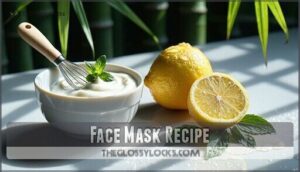This site is supported by our readers. We may earn a commission, at no cost to you, if you purchase through links.

Lemon’s vitamin C and citric acid work overtime to brighten dark spots, fight acne-causing bacteria, and gently exfoliate dead skin cells.
For your hair, it’s a natural lightener that adds shine while tackling dandruff with its antifungal properties.
The natural acids help balance your scalp’s pH, promoting healthier hair growth.
Think of lemon as your grandmother’s beauty secret that actually has science backing it up.
However, there’s a catch about sun exposure that could make or break your lemon routine.
Table Of Contents
- Key Takeaways
- Lemon Benefits Skin
- Lemon Benefits Hair
- Lemon Juice Uses
- Lemon Safety Precautions
- Lemon Health Benefits
- Frequently Asked Questions (FAQs)
- Are lemons good for your hair?
- Is lemon water good for hair & skin?
- Is lemon good for your skin?
- Is lemon juice good for hair?
- What are the benefits of lemon for hair follicles?
- Does lemon lighten hair?
- Is lemon good for your skin and hair?
- What happens if I rub lemon on my face every day?
- Is applying lemon on the face good?
- Is rubbing lemon peel on the face good?
- Conclusion
Key Takeaways
- You’ll get natural acne-fighting power from lemon’s antibacterial properties and vitamin C, which brighten dark spots while gently exfoliating dead skin cells for a radiant complexion.
- You can use lemon juice as a natural hair lightener that adds shine and tackles dandruff with its antifungal properties, while the citric acid balances your scalp’s pH for healthier hair growth.
- You’ll need to dilute lemon juice properly and always patch test first, since pure lemon can cause skin irritation and increased sun sensitivity that leads to burns or blisters.
- You must avoid sun exposure after applying lemon to prevent phototoxic reactions – limit outdoor time to one hour maximum and apply broad-spectrum SPF 30+ sunscreen to treated areas.
Lemon Benefits Skin
You’ve likely reached for lemon juice in your kitchen countless times, but this citrus powerhouse contains natural acids and vitamin C that can transform your skincare routine through science-backed benefits.
The citric acid in lemons acts as a gentle exfoliant while its antibacterial properties target acne, making it a surprisingly effective addition to your beauty arsenal, with the citric acid also providing a natural and gentle way to enhance your skincare routine.
Natural Acne Treatment
Multiple studies confirm lemon’s powerful antimicrobial properties effectively combat acne-causing bacteria while reducing inflammation.
Lemon application offers natural remedies for oily skin through proven bacteria control mechanisms.
A key benefit is that lemons contain anti-inflammatory properties that can soothe irritated skin.
Here’s how lemon benefits skin as an acne treatment:
- Antibacterial action – Limonene compounds inhibit Propionibacterium acnes growth
- Sebum regulation – Controls excess oil production in pores
- Inflammation reduction – Natural anti-inflammatory properties calm irritated skin
- Acne scars – Promotes healing of existing lesions
- Pore minimization – Reduces comedone formation naturally
Skin Brightening Properties
Lemon’s natural citric acid works like nature’s spotlight for your complexion, targeting hyperpigmentation reduction and uneven tone with impressive results.
The vitamin C content accelerates dark spot fading while promoting complexion enhancement through gentle natural lightening.
These lemon benefits skin enthusiasts love most – transforming dull patches into radiant, even-toned skin that glows with renewed brightness and clarity.
Anti-Aging Effects
Your skin’s aging clock can actually slow down with lemon’s powerful antiaging arsenal.
The vitamin C delivers a serious collagen boost, firming up those laugh lines while antioxidant protection shields against daily damage.
You’ll notice improved skin elasticity as cellular regeneration kicks into high gear.
These lemon skin benefits include wrinkle reduction that makes your mirror smile back at you.
Lemon extract’s antioxidant properties fight free radicals, which are responsible for premature aging.
Exfoliating Properties
Your skin’s natural turnover gets a boost from lemon’s alpha hydroxy acid content, which works like nature’s gentle sandpaper.
This natural exfoliant dissolves dead skin removal while promoting cell regeneration beneath the surface.
The citric acid smooths rough patches, revealing a smoother texture and more even skin tone, providing exfoliation without the harsh scrubbing—your complexion will thank you.
Lemon Benefits Hair
Your hair can benefit substantially from lemon’s natural properties, which include citric acid for gentle lightening and vitamin C for promoting healthy growth.
The acidic nature of lemon juice helps balance your scalp’s pH, reduces dandruff, and removes product buildup while adding natural shine to your strands, utilizing the benefits of vitamin C.
Hair Lightening Effects
Beyond skincare magic, lemon’s citric acid works natural hair lightening wonders. Your hair type determines the tone change you’ll see, with blondes experiencing dramatic results while darker shades show subtle shifts.
To potentially improve scalp health, consider its ability to balance pH. This is an important aspect of using lemon juice for hair lightening, as it can have a significant impact on the overall health of your scalp.
Here’s how to maximize your lightening duration:
- Apply fresh lemon juice diluted with water
- Use sun exposure for 30-60 minutes maximum
- Try different application methods like spraying or combing
- Combine with honey for gentler lightening techniques
- Monitor hair lightening benefits versus potential risks
Dandruff Treatment
Those pesky white flakes don’t stand a chance against lemon’s antifungal properties. You can tackle dandruff head-on with a simple scalp massage using fresh lemon juice mixed with coconut oil.
This powerful combo fights seborrheic dermatitis while moisturizing your dry scalp.
| Treatment Method | Ingredients | Application Time | Frequency | Benefits |
|---|---|---|---|---|
| Basic Lemon Rinse | 2 tbsp lemon juice + 1 cup water | 5 minutes | 2x weekly | Reduces flakes |
| Oil Treatment | Lemon juice + coconut oil | 30 minutes | Weekly | Deep moisturizing |
| Scalp Scrub | Lemon + sea salt | 10 minutes | Bi-weekly | Exfoliates buildup |
| Yogurt Mask | Lemon + plain yogurt | 20 minutes | Weekly | Soothes irritation |
| Apple Cider Mix | Lemon + ACV + water | 15 minutes | 2x weekly | Balances pH |
Your scalp health improves as lemon’s natural acids restore balance and eliminate fungal overgrowth that causes those embarrassing flakes, promoting deep moisturizing and helping to reduce flakes and soothe irritation with its powerful combo.
Hair Growth Promotion
While scientific evidence remains limited, lemon’s vitamin C content supports collagen stimulation essential for healthy hair follicles.
The citrus nutrients may enhance nutrient absorption and scalp circulation, creating ideal conditions for hair growth.
Though lemon benefits hair through improved follicle health, don’t expect miraculous overnight results—consistent use alongside proper nutrition delivers the best hair growth outcomes.
Scalp Cleansing Properties
Your scalp deserves better than a chemical cocktail when lemon juice hair treatments offer natural cleansing power.
This citrus superhero tackles multiple scalp issues simultaneously, creating the perfect environment for healthy hair growth.
Here’s how lemon for hair transforms your scalp health:
- pH Balance – Restores your scalp’s natural acidity levels
- Oil Control – Reduces excess sebum production effectively
- Product Buildup – Dissolves styling residue and impurities
- Follicle Health – Unclogs pores for ideal hair growth
- Itch Relief – Soothes irritation while providing dandruff treatment benefits
Lemon Juice Uses
You can transform lemon juice into powerful beauty treatments that address multiple skin and hair concerns with simple, science-backed recipes.
These natural formulations harness lemon’s citric acid, vitamin C, and antimicrobial properties to create effective solutions for brightening skin, treating dandruff, and maintaining healthy hair, utilizing the power of lemon.
Hair Rinse Recipe
This simple lemon juice hair rinse transforms dull locks into glossy strands.
Mix one-quarter cup fresh lemon juice with two cups lukewarm water for ideal dilution. Apply after shampooing, massage gently into your scalp, then rinse with cold water.
For a natural glossy look, you can also mix henna and lemon for vibrant color.
Use this DIY rinse twice weekly for maximum hair shine and lightening benefits.
| Ingredient | Amount |
|---|---|
| Fresh lemon juice | 1/4 cup |
| Lukewarm water | 2 cups |
| Application frequency | 2x weekly |
Skin Toner Recipe
Mix two tablespoons fresh lemon juice with four tablespoons water to create your DIY toner. This lemon concentration balances your skin’s pH while tightening pores.
Apply with cotton pad twice weekly, considering skin sensitivity levels. Store your homemade skin toner in the refrigerator for up to one week.
For purchasing options, consider exploring DIY lemon toner products. These lemon face benefits include reduced oiliness and brighter complexion through gentle DIY remedies.
Face Mask Recipe
You can create powerful DIY masks using simple mask ingredients from your kitchen.
For acne-prone skin, blend one teaspoon lemon juice with honey and baking soda. Oily skin types benefit from yogurt-lemon combinations.
Apply using cotton balls, let each layer dry three minutes, then rinse after ten minutes maximum.
These DIY remedies harness lemon face benefits through proper application techniques and mask frequency. To find the right ingredients, consider sourcing a lemon mask.
Scalp Treatment Recipe
Beyond face masks, your scalp deserves some lemon love too. This powerful scalp cleanser tackles dandruff, oily scalp, and product buildup naturally.
Our DIY recipes work for various scalp conditions:
- Combine fresh lemon juice with coconut oil for dry scalp relief
- Mix lemon with yogurt to combat itchy scalp issues
- Blend lemon and honey for gentle lemon dandruff treatment
Consider using a specialized lemon product for enhanced results. Massage thoroughly, then rinse for healthier lemon hair care with a focus on natural ingredients.
Lemon Safety Precautions
While lemon’s citric acid delivers impressive beauty benefits, it can also trigger skin irritation, hair damage, and dangerous phototoxic reactions when combined with sun exposure.
You’ll want to perform patch tests, dilute lemon juice properly, and limit sun exposure to avoid burns, blisters, and long-term damage to your skin and hair, which can be prevented by taking the right precautions.
Skin Irritation Risks
Lemon’s acidity can trigger skin sensitivity and contact reactions, especially if you have eczema or psoriasis.
The citric acid increases sun sensitivity, potentially causing phytophotodermatitis—basically, your skin throws a tantrum when exposed to sunlight.
Always do a patch test first; apply a small amount behind your ear and wait 24 hours to check for irritation.
Hair Damage Risks
Your hair’s protective cuticle damage becomes real when lemon’s pH 2 acidity strips away natural oils.
Overuse effects include brittleness and breakage, especially concerning sensitive scalps.
Hair lightening risks multiply with repeated applications, while sun sensitivity increases dramatically.
Irritation prevention requires diluting lemon juice and limiting frequency, which is crucial for hair protection and understanding these hair lightening precautions before pursuing natural highlights.
Sun Exposure Risks
Your skin becomes a solar magnet after lemon application.
The citric acid increases photosensitivity, making you prone to cuticle damage and scalp sunburn.
Without proper UV protection, you’re risking phytophotodermatitis—a nasty chemical burn that’ll leave you looking like a lobster.
This irritation amplification can turn a simple beauty routine into a dermatological nightmare.
Lemon can also be used to fight blackheads with citric acid.
- Limit sun exposure to one hour maximum after lemon application
- Apply broad-spectrum sunscreen with SPF 30+ to treated areas
- Wear protective clothing or hats when outdoors post-treatment
- Rinse lemon juice thoroughly before extended outdoor activities
- Watch for signs of phytophotodermatitis like blistering or inflammation
Lemon Health Benefits
Beyond transforming your skin and hair, lemons pack serious nutritional power that supports your overall health from the inside out.
You’re getting a vitamin C powerhouse along with antioxidants, fiber, and essential minerals that boost immunity, aid digestion, and may even help prevent heart disease and kidney stones.
Vitamin C Boost
Your body craves vitamin C, and lemons deliver it in spades.
This powerhouse nutrient kickstarts collagen production, helping your skin stay firm and youthful.
The vitamin C in lemon for skin works overtime, supporting cell repair and skin regeneration while boosting immune support.
Think of it as your daily dose of antioxidant power—nature’s way of keeping you glowing from within.
Antioxidant Properties
Powerful antioxidants in lemons wage war against free radicals that attack your cells daily.
These vitamin C-packed warriors provide Free Radical Defense while promoting Cellular Damage Repair throughout your body.
You’ll notice improved Skin Cell Protection and Anti-Inflammatory Action that supports Youthful Skin Maintenance.
The antioxidant properties of lemon for skin and lemon hair benefits work together, creating natural protection against environmental damage.
However, be aware of lemon’s skin lightening potential, and use cautiously.
Immune System Support
Your body’s defense system gets a serious boost from lemon’s impressive Vitamin C content.
Each citrus powerhouse delivers nearly 60% of your daily vitamin C needs, strengthening white blood cells that fight infections.
The Antioxidant Power protects cells from damage while supporting Overall Wellness.
Regular lemon consumption helps your immune system stay sharp year-round.
Digestive Health Benefits
Beyond boosting immunity, lemon’s citric acid works wonders for your digestive tract.
You’ll find that regular lemon consumption supports gut health by balancing stomach acidity and promoting healthy digestion.
The natural acids provide detox support while offering bloating relief after heavy meals.
Vitamin C enhances nutrient absorption, making lemon an excellent ally against common digestive issues, with lemon being a key factor, and its citric acid and Vitamin C content playing crucial roles.
Frequently Asked Questions (FAQs)
Are lemons good for your hair?
Like nature’s own hair salon, lemon juice acts as your personal stylist.
Yes, lemons are excellent for your hair.
They naturally lighten strands, add shine, reduce dandruff, and stimulate healthy growth through vitamin C.
They offer a range of benefits that can enhance the overall health and appearance of your hair.
Is lemon water good for hair & skin?
Lemon water provides internal hydration that helps your skin glow and maintains elasticity.
While it won’t directly lighten your hair like topical lemon juice, the vitamin C supports collagen production for healthier hair growth, which can be considered a key factor in healthier hair.
Is lemon good for your skin?
You’ll find lemon’s vitamin C brightens your complexion, while its natural acids gently exfoliate dead skin cells.
It fights acne-causing bacteria, balances oily skin, and reduces dark spots for a radiant glow.
Is lemon juice good for hair?
Yes, lemon juice can brighten your hair naturally through citric acid’s bleaching properties.
It works best on lighter tones, adds shine, reduces dandruff, and helps cleanse your scalp when diluted properly.
What are the benefits of lemon for hair follicles?
Your hair follicles benefit from lemon’s vitamin C, which stimulates collagen production and creates a healthier scalp environment.
The citric acid balances pH levels while antifungal properties combat dandruff, promoting stronger hair growth.
Does lemon lighten hair?
Citric acid in fresh lemon juice acts as a natural bleaching agent, gradually lightening your hair by reducing melanin.
You’ll see the best results on blonde or light brown hair, especially with sun exposure.
Is lemon good for your skin and hair?
Like nature’s Swiss Army knife, lemon’s your skin and hair’s best friend.
You’ll get natural brightening, acne-fighting power, and gentle exfoliation for your complexion, plus shine-boosting and dandruff-busting benefits for your locks, with natural brightening and acne-fighting power.
What happens if I rub lemon on my face every day?
Rubbing lemon on your face daily can brighten skin and reduce dark spots.
But it’ll also dry you out and potentially cause irritation.
Your skin might become photosensitive, making sunburn more likely.
Is applying lemon on the face good?
Yes, applying lemon on your face can brighten skin and fight acne with its vitamin C and antibacterial properties.
However, always dilute it and patch test first—pure lemon juice can irritate sensitive skin.
Is rubbing lemon peel on the face good?
Lemon peel contains concentrated citric acid and oils that can brighten skin and provide gentle exfoliation.
However, you’ll want to test it first since it’s more potent than juice and may cause irritation.
Conclusion
Remember, the best things in life are simple, and lemon proves this perfectly.
The benefits of lemon for skin and hair offer you natural solutions backed by science. From brightening dark spots to promoting healthy hair growth, you’ve got a versatile beauty ally.
However, always patch-test first and avoid sun exposure after application to prevent irritation.
When used correctly, lemon transforms your beauty routine with vitamin C-powered results that won’t break the bank, providing natural solutions and a versatile beauty ally.
- https://www.healthline.com/health/beauty-skin-care/honey-and-lemon-for-face
- https://www.organicfacts.net/health-benefits/fruit/health-benefits-of-lemon.html
- https://www.sciencedirect.com/science/article/pii/S2212958824001356
- https://nikura.com/blogs/essential-oils/benefits-and-uses-of-lemon-oil
- https://www.netmeds.com/health-library/post/incredible-benefits-of-lemon-for-healthy-skin-and-hair












